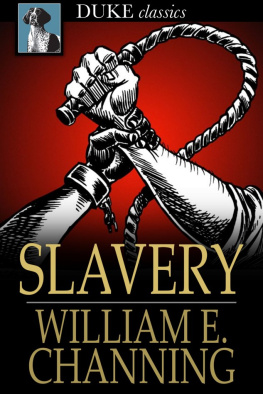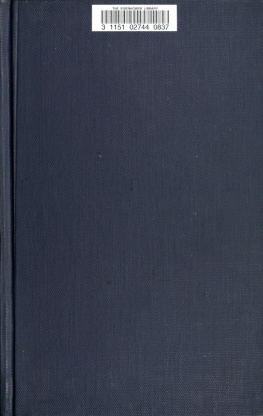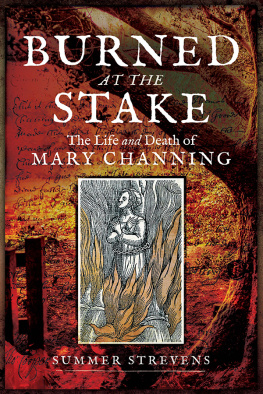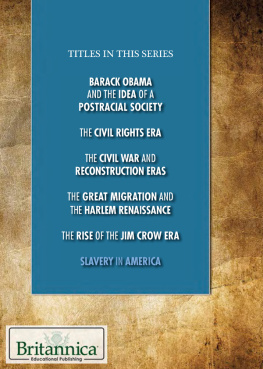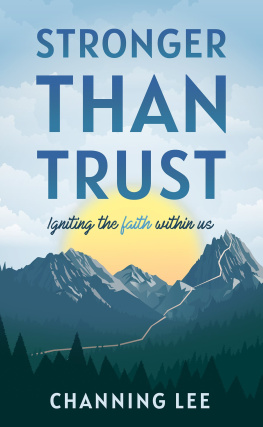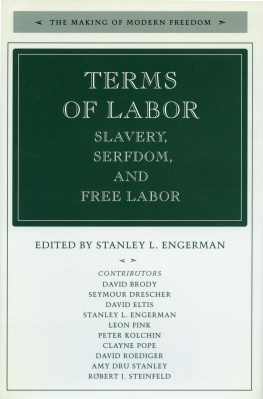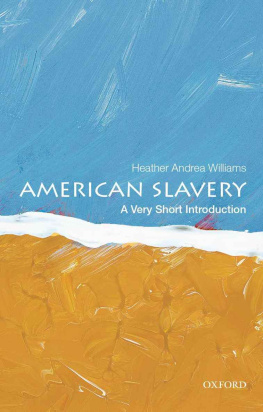William E. Channing - Slavery
Here you can read online William E. Channing - Slavery full text of the book (entire story) in english for free. Download pdf and epub, get meaning, cover and reviews about this ebook. year: 2014, publisher: Duke Classics, genre: Science. Description of the work, (preface) as well as reviews are available. Best literature library LitArk.com created for fans of good reading and offers a wide selection of genres:
Romance novel
Science fiction
Adventure
Detective
Science
History
Home and family
Prose
Art
Politics
Computer
Non-fiction
Religion
Business
Children
Humor
Choose a favorite category and find really read worthwhile books. Enjoy immersion in the world of imagination, feel the emotions of the characters or learn something new for yourself, make an fascinating discovery.
- Book:Slavery
- Author:
- Publisher:Duke Classics
- Genre:
- Year:2014
- Rating:3 / 5
- Favourites:Add to favourites
- Your mark:
- 60
- 1
- 2
- 3
- 4
- 5
Slavery: summary, description and annotation
We offer to read an annotation, description, summary or preface (depends on what the author of the book "Slavery" wrote himself). If you haven't found the necessary information about the book — write in the comments, we will try to find it.
Renowned Unitarian preacher, thinker, and theologian William E. Channing takes an in-depth look at the issue of slavery in this compelling volume. Written at a time when the United States was still profiting mightily from the fruits of slave labor, Channing presents a multi-faceted moral argument against the practice, as well as a practical model for moving away from a reliance on enslaved workers.
Slavery — read online for free the complete book (whole text) full work
Below is the text of the book, divided by pages. System saving the place of the last page read, allows you to conveniently read the book "Slavery" online for free, without having to search again every time where you left off. Put a bookmark, and you can go to the page where you finished reading at any time.
Font size:
Interval:
Bookmark:

First published in 1835
ISBN 978-1-62013-717-8
Duke Classics
2014 Duke Classics and its licensors. All rights reserved.
While every effort has been used to ensure the accuracy and reliability of the information contained in this edition, Duke Classics does not assume liability or responsibility for any errors or omissions in this book. Duke Classics does not accept responsibility for loss suffered as a result of reliance upon the accuracy or currency of information contained in this book.
The first question to be proposed by a rational being is, not what isprofitable, but what is Right. Duty must be primary, prominent, mostconspicuous, among the objects of human thought and pursuit. If we castit down from its supremacy, if we inquire first for our interests andthen for our duties, we shall certainly err. We can never see the Rightclearly and fully, but by making it our first concern. No judgment canbe just or wise, but that which is built on the conviction of theparamount worth and importance of Duty. This is the fundamental truth,the supreme law of reason; and the mind, which does not start from thisin its inquiries into human affairs, is doomed to great, perhaps fatalerror.
The Right is the supreme good, and includes all other goods. In seekingand adhering to it, we secure our true and only happiness. Allprosperity, not founded on it, is built on sand. If human affairs arecontrolled, as we believe, by Almighty Rectitude and Impartial Goodness,then to hope for happiness from wrong doing is as insane as to seekhealth and prosperity by rebelling against the laws of nature, by sowingour seed on the ocean, or making poison our common food. There is butone unfailing good; and that is, fidelity to the Everlasting Law writtenon the heart, and rewritten and republished in God's Word.
Whoever places this faith in the everlasting law of rectitude must ofcourse regard the question of slavery first and chiefly as a moralquestion. All other considerations will weigh little with him, comparedwith its moral character and moral influences. The following remarks,therefore, are designed to aid the reader in forming a just moraljudgment of slavery. Great truths, inalienable rights, everlastingduties, these will form the chief subjects of this discussion. There aretimes when the assertion of great principles is the best service a mancan render society. The present is a moment of bewildering excitement,when men's minds are stormed and darkened by strong passions and fierceconflicts; and also a moment of absorbing worldliness, when the morallaw is made to bow to expediency, and its high and strict requirementsare decried or dismissed as metaphysical abstractions, or impracticabletheories. At such a season, to utter great principles without passion,and in the spirit of unfeigned and universal good-will, and to engravethem deeply and durably on men's minds, is to do more for the world,than to open mines of wealth, or to frame the most successful schemes ofpolicy.
Of late our country has been convulsed by the question of slavery; andthe people, in proportion as they have felt vehemently, have thoughtsuperficially, or hardly thought at all; and we see the results in asingular want of well defined principles, in a strange vagueness andinconsistency of opinion, and in the proneness to excess which belongsto unsettled minds. The multitude have been called, now to contemplatethe horrors of slavery, and now to shudder at the ruin and bloodshedwhich must follow emancipation. The word Massacre has resounded throughthe land, striking terror into strong as well as tender hearts, andawakening indignation against whatever may seem to threaten such aconsummation. The consequence is, that not a few dread all discussion ofthe subject, and if not reconciled to the continuance of slavery, atleast believe that they have no duty to perform, no testimony to bear,no influence to exert, no sentiments to cherish and spread, in relationto this evil. What is still worse, opinions either favoring orextenuating it are heard with little or no disapprobation. Concessionsare made to it which would once have shocked the community; whilst toassail it is pronounced unwise and perilous. No stronger reason for acalm exposition of its true character can be given, than this verystate of the public mind. A community can suffer no greater calamitythan the loss of its principles. Lofty and pure sentiment is the lifeand hope of a people. There was never such an obligation to discussslavery as at this moment, when recent events have done much to unsettleand obscure men's minds in regard to it. This result is to be ascribedin part to the injudicious vehemence of those who have taken into theirhands the care of the slave. Such ought to remember that to espouse agood cause is not enough. We must maintain it in a spirit answering toits dignity. Let no man touch the great interests of humanity, who doesnot strive to sanctify himself for the work by cleansing his heart ofall wrath and uncharitableness, who cannot hope that he is in a measurebaptized unto the spirit of universal love. Even sympathy with theinjured and oppressed may do harm, by being partial, exclusive, andbitterly indignant. How far the declension of the spirit of freedom isto be ascribed to the cause now suggested I do not say. The effect isplain, and whoever sees and laments the evil should strive to arrest it.
Slavery ought to be discussed. We ought to think, feel, speak, and writeabout it. But whatever we do in regard to it should be done with a deepfeeling of responsibility, and so done as not to put in jeopardy thepeace of the slave-holding States. On this point public opinion has notbeen and cannot be too strongly pronounced. Slavery, indeed, from itsvery nature, must be a ground of alarm wherever it exists. Slavery andsecurity can by no device be joined together. But we may not, must not,by rashness and passion increase the peril. To instigate the slave toinsurrection is a crime for which no rebuke and no punishment can be toosevere. This would be to involve slave and master in common ruin. It isnot enough to say, that the Constitution is violated by any actionendangering the slave-holding portion of our country. A higher law thanthe Constitution forbids this unholy interference. Were our nationalunion dissolved, we ought to reprobate, as sternly as we now do, theslightest manifestation of a disposition to stir up a servile war. Stillmore, were the free and the slave-holding States not only separated, butengaged in the fiercest hostilities, the former would deserve theabhorrence of the world, and the indignation of Heaven, were they toresort to insurrection and massacre as means of victory. Better were itfor us to bare our own breasts to the knife of the slave, than to armhim with it against his master.
It is not by personal, direct action on the mind of the slave that wecan do him good. Our concern is with the free. With the free we are toplead his cause. And this is peculiarly our duty, because we have boundourselves to resist his efforts for his own emancipation. We suffer himto do nothing for himself. The more, then, should be done for him. Ourphysical power is pledged against him in case of revolt. Then our moralpower should be exerted for his relief. His weakness, which we increase,gives him a claim to the only aid we can afford, to our moral sympathy,to the free and faithful exposition of his wrongs. As men, asChristians, as citizens, we have duties to the slave, as well as toevery other member of the community. On this point we have no liberty.The Eternal Law binds us to take the side of the injured; and this lawis peculiarly obligatory, when we forbid him to lift an arm in his owndefence.
Font size:
Interval:
Bookmark:
Similar books «Slavery»
Look at similar books to Slavery. We have selected literature similar in name and meaning in the hope of providing readers with more options to find new, interesting, not yet read works.
Discussion, reviews of the book Slavery and just readers' own opinions. Leave your comments, write what you think about the work, its meaning or the main characters. Specify what exactly you liked and what you didn't like, and why you think so.

